Ditapis dengan

Syllabus : Maritime Policies & Governmental Politics Part II
- Edisi
- Maritime Policies & Governmental Politics
- ISBN/ISSN
- -
- Deskripsi Fisik
- illus,; 30 cm
- Judul Seri
- Maritime Policies & Governmental Politics
- No. Panggil
- CC STC SYL m C1
- Edisi
- Maritime Policies & Governmental Politics
- ISBN/ISSN
- -
- Deskripsi Fisik
- illus,; 30 cm
- Judul Seri
- Maritime Policies & Governmental Politics
- No. Panggil
- CC STC SYL m C1
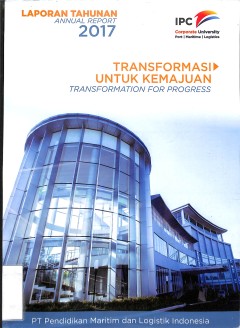
Laporan Tahunan 2017 : Transformasi Untuk Kemajuan
- Edisi
- Laporan Tahunan 2017
- ISBN/ISSN
- -
- Deskripsi Fisik
- 214p
- Judul Seri
- -
- No. Panggil
- IPC REP 2017 LAP l C.1
- Edisi
- Laporan Tahunan 2017
- ISBN/ISSN
- -
- Deskripsi Fisik
- 214p
- Judul Seri
- -
- No. Panggil
- IPC REP 2017 LAP l C.1

A non-structural test for competition in the container liner shipping industry
The liner shipping industry has experienced fundamental changes in recent years due to globalization, deregulation, horizontal/vertical integration, (increased) cooperation, rationalization, developments in information technology, consolidation and increased concentration. These developments may affect competition. As in other industries, competition in the (containerized) liner shipping indust…
- Edisi
- Maritime Logistics
- ISBN/ISSN
- -
- Deskripsi Fisik
- 17 halaman
- Judul Seri
- A non-structural test for competition in the container liner shipping industry
- No. Panggil
- ATC PO CHR a

An Evaluation of Container Development Strategies in the Port of Taichung
Abstract The objective of this study is to examine the container development strategies in the port of Taichung from the viewpoints of carriers, port authorities and shipping academics. The six most important strategic attributes from the all respondents perceptions are Enhancing the services of direct shipping with Mainland China, simplified customs procedures, simplified administrative proce…
- Edisi
- The Asian Journal of Shipping and Logistics
- ISBN/ISSN
- -
- Deskripsi Fisik
- 26 halaman
- Judul Seri
- An Evaluation of Container Development Strategies in the Port of Taichung
- No. Panggil
- ATC PO CHI a

Understanding organizational change for alliancing
Abstract Purpose – The purpose of this paper is to examine an organization’s operational alignment in the process of alliance formation. Design/methodology/approach – A literature study was conducted on the strategic importance of assessing and aligning organizations’ operations for alliancing. Furthermore, an instrumental case study was conducted to provide insight in the degree of op…
- Edisi
- Journal of Organizational Change Management
- ISBN/ISSN
- -
- Deskripsi Fisik
- 18 halaman
- Judul Seri
- Understanding organizational change for alliancing
- No. Panggil
- ATC PO BIA a

Towards a Better Understanding of Experience during Trips: Impact on Satisfac…
AbstractPurpose – The purpose of this paper is to reinforce the experiential paradigm from which academics and practitioners currently explain consumer decision making in touristic activities. More specifically, this research brings new insights for understanding consumption experience. The aim is to establish relationships between Experience, Satisfaction, Destination Attachment, as well as …
- Edisi
- International Journal of Tourism Cities
- ISBN/ISSN
- -
- Deskripsi Fisik
- 40 halaman
- Judul Seri
- Towards a Better Understanding of Experience during Trips: Impact on Satisfaction, Destination Attachment and Word-of-Mouth
- No. Panggil
- ATC PO HAG a

Time to rethink Norwegian maritime collaboration exercises
Purpose This case study maps the perceived collaboration between public, private, and volunteer organizations during maritime crisis work, with a substantive focus on communication, information flow, and distribution of activities. The exercise studied was held in the far north in Norway. It was estimated to be Europe’s most extensive exercise in 2016. Design The data were collected through …
- Edisi
- International Journal of Emergency Services
- ISBN/ISSN
- -
- Deskripsi Fisik
- 30 halaman
- Judul Seri
- Time to rethink Norwegian maritime collaboration exercises
- No. Panggil
- ATC PO ELS a

Service quality in maritime transport: conceptual model and empirical evidence
Abstract Purpose – The purpose of this paper is to extend knowledge on service quality and how it is defined and thus, managed, in the context of maritime transport by proposing and testing a new conceptual model of service quality. Design/methodology/approach – The study used a sample of 197 shipping companies, port operators and freight forwarders/logistics service providers, employing t…
- Edisi
- Service quality in maritime transport
- ISBN/ISSN
- -
- Deskripsi Fisik
- 26 halaman
- Judul Seri
- Service quality in maritime transport: conceptual model and empirical evidence
- No. Panggil
- ATC PO VIN a

Senses of “shipscapes”: an artful navigation of ship architecture and aes…
Abstract Purpose – In the context of organizational aesthetics, “built environments” remain under-explored. The purpose of this paper is to enter the maritime world of ship architectures to navigate sensory-aesthetic knowledge of a sailor’s place-based memories. Design/methodology/approach – Challenges have been issued to explore the potential for artistic-sensual methodologies to b…
- Edisi
- Journal of Organizational Change Management
- ISBN/ISSN
- -
- Deskripsi Fisik
- 19 halaman
- Judul Seri
- Senses of “shipscapes”: an artful navigation of ship architecture and aesthetics
- No. Panggil
- ATC PO JOH a

Revisiting the resource-based view on logistics performance in the shipping i…
Abstract Purpose –The purpose of this study is to evaluate empirically the impact of intrafirm resources, interfirm relationships, and logistics service capabilities on logistics performance in the container logistics context. Design/methodology/approach –Factor analysis was employed to identify the key intrafirm resources (i.e. tangible assets and intangible assets), interfirm relation…
- Edisi
- International Journal of Physical Distribution & L
- ISBN/ISSN
- -
- Deskripsi Fisik
- 29 halaman
- Judul Seri
- Revisiting the resource-based view on logistics performance in the shipping industry
- No. Panggil
- ATC PO CHU a

Maritime Safety Culture in Europe
Therefore, it was time for the European Union to act and to develop a new concept of safety culture. A parallel can be drawn between the attitude of the International Maritime Organisation (IMO) and the attitude of the European Union. The IMO is well known for promoting and improving safety and also in being reactive to maritime disasters. Now we discover a new philosophy of “anticipating a…
- Edisi
- Managerial Law
- ISBN/ISSN
- -
- Deskripsi Fisik
- 61 halaman
- Judul Seri
- Maritime Safety Culture in Europe
- No. Panggil
- ATC PO LUC a

Maritime piracy and the cost of world trade*
Abstract Purpose – The aim of this study is to determine the nature and extent of the threat of global maritime piracy. The cost of global piracy has been estimated at USD15-25 billion, reaching an all-time high in 2011, remaining an ongoing threat to world trade and contributing to high commodity costs.
- Edisi
- Maritime piracy
- ISBN/ISSN
- -
- Deskripsi Fisik
- 14 Halaman
- Judul Seri
- Maritime piracy and the cost of world trade*
- No. Panggil
- ATC PO STE a

Knowledge management capability and supply chain management practices in the …
Abstract Purpose – The main goal of this research is to examine the effect of knowledge management capabilities on supply chain management practices and organizational performance in firms, in addition to examining the effect of supply chain management on organizational performance. Design/methodology/approach – To demonstrate the effect of knowledge management capabilities on supply chain…
- Edisi
- Business Process Management Journal
- ISBN/ISSN
- -
- Deskripsi Fisik
- 24 halaman
- Judul Seri
- Knowledge management capability and supply chain management practices in the Saudi food industry
- No. Panggil
- ATC PO AHM a

Impact of Maritime Labour Convention on design of new ships
Abstract Purpose – The Maritime Labour Convention (MLC) embodies standards of existing international maritime labour conventions and recommendations, as well as the fundamental principles to be found in other international labour conventions. The aim of the convention is to address the employment standards of seafarers in the areas of fair wages, contractual terms, working and living condit…
- Edisi
- Maritime Business Review
- ISBN/ISSN
- -
- Deskripsi Fisik
- 14 halaman
- Judul Seri
- Impact of Maritime Labour Convention on design of new ships
- No. Panggil
- ATC PO HWA a

Evaluating the use of alternative maritime power in Taiwan
Abstract Purpose – The purpose of this study is to empirically evaluate the impacts of institutional pressures on the use of alternative maritime power (AMP) and which in turn enhance environmental performance in the maritime shipping context. Design/methodology/approach – Factor analysis was used to identify the key coercive pressure, normative pressure, mimetic pressure, AMP practice and…
- Edisi
- Maritime Business Review
- ISBN/ISSN
- -
- Deskripsi Fisik
- 18 Halaman
- Judul Seri
- Evaluating the use of alternative maritime power in Taiwan
- No. Panggil
- ATC PO CHU a

Evaluating the supply chain information flow in Egyptian SMEs using six sigma…
Abstract Purpose – There is a great deal of concern among the Egyptian economy that small- and medium-sized enterprises’ (SMEs’) potentials are not fully used although they dominate it and contribute to its success. The question is what challenges are preventing those SMEs from performing efficiently. This research aims to focus on examining the issues regarding the supply chain of Egypt…
- Edisi
- International Journal of Lean Six Sigma
- ISBN/ISSN
- -
- Deskripsi Fisik
- 30 halaman
- Judul Seri
- International Journal of Lean Six Sigma
- No. Panggil
- ATC PO OMN a

Australian Association for Maritime History
The major problems with this work centre upon the author's failure to provide it with a coherent conceptual framework, and a concomitant lack of integration between the component parts of the book. The author states his objectives, but the questions posed remain largely unanswered in what is essentially a series of essays about sone aspects of planning in some port cities of early modern Europe…
- Edisi
- Maritime History
- ISBN/ISSN
- -
- Deskripsi Fisik
- 3 halaman
- Judul Seri
- Australian Association for Maritime History
- No. Panggil
- ATC PO KEN a
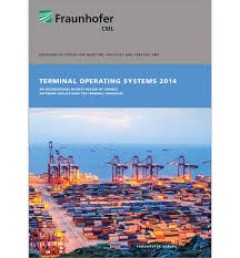
Terminal operating systems 2014 : an international market review of current s…
The worldwide market of terminal operating systems is very heterogeneous. It is characterized by many providers each of them offering more than one different product. The range of functions of each product is quite diverse depending on the scope of the product. This market survey is supposed to bring transparency into this market. Therefore public information as well as information derived from…
- Edisi
- -
- ISBN/ISSN
- 978-3-8396-0730-5
- Deskripsi Fisik
- 63 p., 33 cm
- Judul Seri
- -
- No. Panggil
- TXT PO JAH t
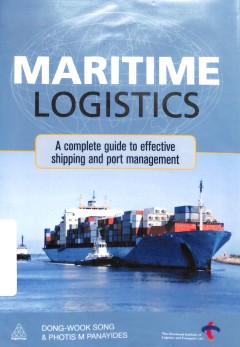
Maritime logistic : a complete guide to effective shipping and port management
Current globalization and borderless operations in manufacturing are creating a greater demand for international transportation and supply chain logistics. Maritime (shipping and ports) is one of the key components in this business pattern. It is now estimated that approximately 90% of global trading freight moves by ship. As this trade increases it is becoming more important to have a clear un…
- Edisi
- -
- ISBN/ISSN
- 978-0-7494-63694
- Deskripsi Fisik
- xiv, 326 p., 24 cm ; index
- Judul Seri
- -
- No. Panggil
- LC 388.04 SON m
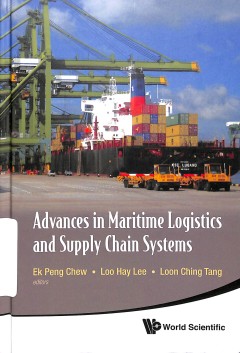
Advances in Maritime Logistik and Supply Chain Systems
This timely book discusses the recent developments in maritime logistics, an important specialized area for the global economy. It includes issues such as the recent economic crisis, port competition and development, and provides insights and trends relating to these issues. Consisting of renowned researchers worldwide, the primary objective of the book identifies some of the new problems and c…
- Edisi
- -
- ISBN/ISSN
- 13-978-981-4329-85-9
- Deskripsi Fisik
- xvi, 315 p. ; 26 cm.
- Judul Seri
- -
- No. Panggil
- TXT LO SON m
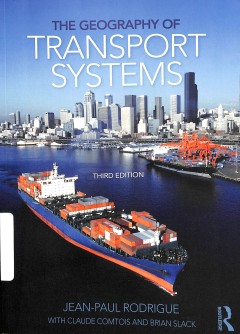
The geography of transport systems
The geography of transport systems is now into its third edition,. substantial efforts have been made to build on the first and second editions' success by improving the content and this structure.
- Edisi
- 3rd Ed.
- ISBN/ISSN
- 978-0-415-82254-1
- Deskripsi Fisik
- 411 p., 23 cm
- Judul Seri
- -
- No. Panggil
- TXT LO ROD g
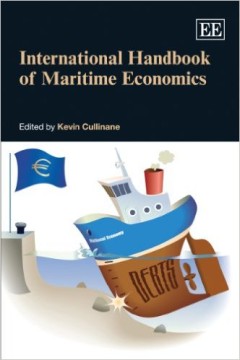
International Handbook of Maritime Economics
This timely and comprehensive new Handbook brings together an unrivaled group of distinguished scholars and practitioners to provide in-depth analysis and a contemporary perspective on a wide-ranging array of topics in maritime economics. Inherently global in nature, the economics of the maritime sector has proved pivotal in facilitating globalization and international trade. This HandbOOK o…
- Edisi
- -
- ISBN/ISSN
- 978-1-84720-933-7
- Deskripsi Fisik
- xix, 497 hlm., 21 cm
- Judul Seri
- -
- No. Panggil
- TXT MR CUL i

Impact of scale increase of container ships on the generalised chain cost
In recent years, an increase in the size of the container ships could be observed. The question is how these larger ships will influence the total generalised costs from a port of loading to a destination in the European hinterland. The second question is whether a scale increase of the container ships on other loops, such as a loop from the United States to Europe, has the same impact on the g…
- Edisi
- Vol. 43, No. 2, 192–208
- ISBN/ISSN
- 1464-5254
- Deskripsi Fisik
- 18 p.
- Judul Seri
- Maritime Policy & Management The flagship journal of international shipping and port research
- No. Panggil
- ATC LO HAS i

Greening ports and maritime logistics: A review
This paper aims to examine the past and present research on ‘green ports and maritime logistics’ in order to identify established research streams and fertile research areas with potential for future investigations. Using rigorous bibliometric and network analysis tools, the paper completes a systemic mapping of the existing literature and identifies the key investigators, collaboration pat…
- Edisi
- 2015
- ISBN/ISSN
- -
- Deskripsi Fisik
- 15 p.
- Judul Seri
- Greening ports and maritime logistics
- No. Panggil
- ATC LO DAV g

Enhanced logistics service provider framework for higher integration and effi…
The concept of maritime logistics results from the convergence of maritime transport and supply chains. The paper aims to propose an enhanced logistics service provider (LSP) framework which facilitates LSPs to integrate supply chains in an optimal manner by utilising their unique expertise and experience. In the framework, the enhanced LSP serves as the single contact point for shippers and as…
- Edisi
- Vol. 17, No. 2, 89–113
- ISBN/ISSN
- -
- Deskripsi Fisik
- 27 p.
- Judul Seri
- International Journal of Logistics Research and Applications: A Leading Journal of Supply Chain Management
- No. Panggil
- ATC LO LAM e

Defining maritime logistics hub and its implication for container port
Since the hub-and-spoke concept was introduced to the aviation market after the US airline deregulation in the late 1970s, it becomes a primary distribution model employed by leading international logistics companies. This pattern drives the companies to consolidate shipments on the large scale at major terminals (i.e. hub) and to redistribute the smaller scale of shipments to their respective …
- Edisi
- VOL. 38, NO. 3, 269–292
- ISBN/ISSN
- 1464–5254
- Deskripsi Fisik
- 25 p.
- Judul Seri
- Maritime Policy & Management: The flagship journal of international shipping and port research
- No. Panggil
- ATC LO NAM d

Comparison of the operating performance of automated and traditional containe…
This paper explores key factors affecting the operating performance of container terminals, and compares the performance of various container yard (CY) facilities at the port of Kaohsiung using grey relational analysis (GRA) and the concept of entropy. The paper’s findings can be summarised as follows: (1) The most important attributes affecting the operating performance of CY equipment inclu…
- Edisi
- Vol. 16, No. 2, 158–173
- ISBN/ISSN
- -
- Deskripsi Fisik
- 18 p.
- Judul Seri
- International Journal of Logistics Research and Applications
- No. Panggil
- ATC LO YAN c

Bi-objective optimization for the container terminal integrated planning
In this paper, we study the joint optimization of the tactical berth allocation and the tac- tical yard allocation in container terminals, which typically consist of berth side and yard side operations. The studied two objectives are: (i) the minimization of the violation of the vessels’ expected turnaround time windows with the purpose of meeting the timeta- bles published by shipping liners…
- Edisi
- 2016
- ISBN/ISSN
- -
- Deskripsi Fisik
- 30 p.
- Judul Seri
- Transportation Research Part B
- No. Panggil
- ATC LO LIU b

Maritime Logistics and Supply Chain Security
Despite a hangover from the worldwide economic crisis, international trade rebounded nicely with a record-level growth in late 2010. A sharp rise in international trade has sparked the international traffic growth. A majority of this traffic growth originated from maritime logistics which could move cargoes in large volume and at cheaper freight costs. Due to its cost-efficiency and easy acces…
- Edisi
- 2012
- ISBN/ISSN
- 978-1-78052-340-8
- Deskripsi Fisik
- 27 P
- Judul Seri
- Maritime Logistics
- No. Panggil
- ATC LO MIN m

Maritime logistics in EU green ports and short sea shipping
- Edisi
- -
- ISBN/ISSN
- 978-1-78052-340-8
- Deskripsi Fisik
- 19 p.
- Judul Seri
- Maritime Logistics
- No. Panggil
- ATC MR GOU m
- Edisi
- -
- ISBN/ISSN
- 978-1-78052-340-8
- Deskripsi Fisik
- 19 p.
- Judul Seri
- Maritime Logistics
- No. Panggil
- ATC MR GOU m
Advances in Maritime Logistics and Supply Chain Systems
Over the recent years, maritime logistics and supply chains have witnessed tremendous growth rates around the world, notwithstanding the recent economic downturn. Maritime transportation accounts for the majority of international trade and it has become a vital factor for the economic health of many nations. In emrging economies, more new ports have also been developed to tap into the global ma…
- Edisi
- -
- ISBN/ISSN
- 978-981-4329-85-9
- Deskripsi Fisik
- xiii, 213p
- Judul Seri
- -
- No. Panggil
- TXT LO CHE a
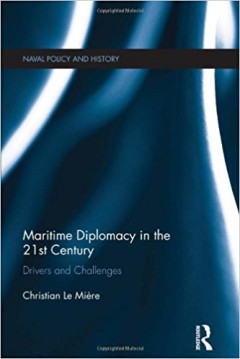
Maritime Diplomacy in the 21st Century
It is impossible to quantify the effects certain individuals have on the planning and creation of a book. Whether it be guidance, direct intervention or just general support, it is inevitable that a task that at times appeared to be a lonely, individual chore was, nevertheless, reliant on a number of people who offered guidance, encouragement or support. The initial idea was given credence by c…
- Edisi
- -
- ISBN/ISSN
- 978-0-203-55559-0
- Deskripsi Fisik
- v, 156 p
- Judul Seri
- -
- No. Panggil
- TXT MR MIE m
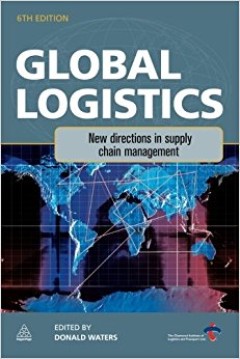
Global logistics
The first edition of Global Logistics and Distribution Planning: Strategies for Management appeared in 1988. Since then the whole field of logistics has changed. Of course, there is still agreement about the basic principle of a supply chain as ‘the series of activities and organizations that materials both tangible and intangible – move through on their journeys from initial suppliers to…
- Edisi
- sixth ed.
- ISBN/ISSN
- 978 0 7494 5703 7
- Deskripsi Fisik
- XXVI, 505 ; INDEX
- Judul Seri
- -
- No. Panggil
- TXT LO WAT g

Knowledge Management For Maritime Logistics Value: Discussing Conceptual Issues
This paper introduces the concept of maritime logistics value as one of the most significant strategic goals that maritime operators want to achieve. The value is reflected in operational efficiency (e.g. reducing lead time and business costs) and service effectiveness (e.g. flexibility, responsiveness and reliability in the service). Drawing from key theories and practices in strategic man…
- Edisi
- VOL. 37, NO. 6
- ISBN/ISSN
- 1464-5254
- Deskripsi Fisik
- 22 p
- Judul Seri
- Maritime Policy & Management
- No. Panggil
- ATC MR LEE k
Maritime logistics : contemporary issues
- Edisi
- -
- ISBN/ISSN
- 978-1-78052-340-8
- Deskripsi Fisik
- vii, 289 p.; 21 cm
- Judul Seri
- -
- No. Panggil
- LO SON m
- Edisi
- -
- ISBN/ISSN
- 978-1-78052-340-8
- Deskripsi Fisik
- vii, 289 p.; 21 cm
- Judul Seri
- -
- No. Panggil
- LO SON m

MARITIME LETTERS OF INDEMNITY
This unique new title provides expert, hands-on advice as to the law and practice of the maritime letter of indemnity. Detailing the variety of implications that can arise from each type of letter, the authors bring this important and litigious subject to the fore with a view to reducing the commercial and legal risks involved in this core area of shipping and international trade.
- Edisi
- -
- ISBN/ISSN
- 978-1-31585-147-1
- Deskripsi Fisik
- xxiii, 205 p
- Judul Seri
- -
- No. Panggil
- TXT MR ARI m
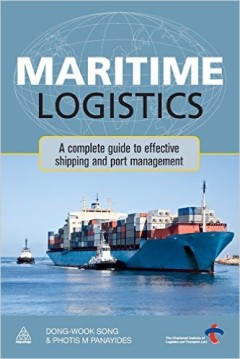
Maritime Logistics: A Complete Guide to Effective Shipping and Port Management
Current globalization and borderless operations in manufacturing are creating a greater demand for international transportation and supply chain logistics. Maritime (shipping and ports) is one of the key components in this business pattern. It is now estimated that approximately 90% of global trading freight moves by ship. As this trade increases it is becoming more important to have a clear un…
- Edisi
- -
- ISBN/ISSN
- 978-0-7494-6369-4
- Deskripsi Fisik
- xiv, 326p. ; 24cm.
- Judul Seri
- -
- No. Panggil
- LO SON m

The influence of supply chain collaboration on collaborative advantage and po…
Although many academics and practitioners in the maritime industry have recognised the importance of supply chain collaboration (SCC) between ports and port users, there is still a lack of empirical work on this issue. This work empirically investigates the association between SCC, collaborative advantage and port performance in a maritime logistics context. Data were collected via a web-based …
- Edisi
- -
- ISBN/ISSN
- -
- Deskripsi Fisik
- 22 p.
- Judul Seri
- International Journal of Logistics Research and Applications
- No. Panggil
- ATC LO ROS t

Location of mid-range dry ports in multimodal logistic networks
In the recent literature a lot of attention has been given to intermodal transportation networks, mainly related to inland freight mobility. In particular, the landside distribution of maritime containers from/to seaports has been the focus of many research works. In fact, seaports are now suffering the lack of space at maritime terminals and the growing congestion on their access routes with t…
- Edisi
- -
- ISBN/ISSN
- -
- Deskripsi Fisik
- 11 p.
- Judul Seri
- -
- No. Panggil
- ATC PO SCO l

Coopetitive Networks, Knowledge Acquisition And Maritime Logistics Value
Knowledge acquisition may help maritime operators to maximise maritime logistic value. The operators can acquire knowledge through being embedded in a coopetitive (viz. mixture of cooperation and competition) network. This paper aims to examine how effectively maritime logistics operators coordinate the inter-organisational coopetitive relationships in order to acquire knowledge. The paper also…
- Edisi
- Vol. 15, No. 1, 2012
- ISBN/ISSN
- 1469-848X
- Deskripsi Fisik
- 22 p
- Judul Seri
- International Journal of Logistics Research and Applications A Leading Journal of Supply Chain Management
- No. Panggil
- ATC MR SON c

Multi-Product Maritime Inventory Routing With Optional Cargoes : An Applicati…
Purpose – The ocean transportation of automobiles is carried out by specialized Roll-on/Roll-off ships, which are designed to carry a large number of automobiles at a time. Many of these shipping companies have vertically integrated or collaborated with other logistics services providers to offer integrated maritime logistics solution to car manufacturers. The purpose of this study is to d…
- Edisi
- Vol. 10 Iss 2
- ISBN/ISSN
- 0972-7981
- Deskripsi Fisik
- 26 p
- Judul Seri
- Journal of Advances in Management Research
- No. Panggil
- ATC MR CHA m

Multi-Product Maritime Inventory Routing With Optional Cargoes : An Applicati…
Purpose – The ocean transportation of automobiles is carried out by specialized Roll-on/Roll-off ships, which are designed to carry a large number of automobiles at a time. Many of these shipping companies have vertically integrated or collaborated with other logistics services providers to offer integrated maritime logistics solution to car manufacturers. The purpose of this study is to d…
- Edisi
- Vol. 10 Iss 2 pp
- ISBN/ISSN
- 0972-7981
- Deskripsi Fisik
- 26 p
- Judul Seri
- Journal of Advances in Management Research
- No. Panggil
- ATC MR CHA m

Multi-product maritime inventory routing with optional cargoes : An applicati…
The ocean transportation of automobiles is carried out by specialized Roll-on/Roll-off ships, which are designed to carry a large number of automobiles at a time. Many of these shipping companies have vertically integrated or collaborated with other logistics services providers to offer integrated maritime logistics solution to car manufacturers. The purpose of this study is to develop an optim…
- Edisi
- Vol. 10 No. 2, 2013 pp. 206-229
- ISBN/ISSN
- -
- Deskripsi Fisik
- 26 p.
- Judul Seri
- Journal of Advances in Management Research
- No. Panggil
- ATC LO AGA m

Asean’s initiatives for regional economic integration and the implications …
The purpose of this paper is to estimate the economic impact of reducing logistics cost on the demand for port throughput in the context of Association of Southeast Asian Nations (ASEAN) regional economic integration and to realize the potential economic gains of the maritime logistics reform in the region.
- Edisi
- Vol. 26 Iss 3
- ISBN/ISSN
- 0957-4093
- Deskripsi Fisik
- 17 pages
- Judul Seri
- The International Journal of Logistics Management
- No. Panggil
- ATC MR CHE a

ASEAN’s initiatives for regional economic integration and the implications …
The purpose of this paper is to estimate the economic impact of reducing logistics cost on the demand for port throughput in the context of Association of Southeast Asian Nations’ (ASEAN) regional economic integration and to realize the potential economic gains of the maritime logistics reform in the region.
- Edisi
- Vol. 26 No. 3, 2015 pp. 479-493
- ISBN/ISSN
- -
- Deskripsi Fisik
- 17 p.
- Judul Seri
- The International Journal of Logistics Management
- No. Panggil
- ATC LO SUT a

An integrated terminal operating system for enhancing the efficiency of seapo…
A seaport terminal is a vital link in the global supply chain which has a profound impact on port competitiveness and international trade. However, ongoing worldwide economic slumps, coupled with the proliferation of terminal operators, have created a glut for terminal-related logistics services and intensified competition among terminal operators. As a way to better utilize the existing termin…
- Edisi
- -
- ISBN/ISSN
- -
- Deskripsi Fisik
- 23 P.
- Judul Seri
- -
- No. Panggil
- ATC LO MIN a

Maritime Logistics and Supply Chain Security
Despite a hangover from the worldwide economic crisis, international trade rebounded nicely with a record-level growth in late 2010. A sharp rise in international trade has sparked the international traffic growth. A majority of this traffic growth originated from maritime logistics which could move cargoes in large volume and at cheaper freight costs. Due to its cost-efficiency and easy access…
- Edisi
- Vol. 34 Iss 10 pp
- ISBN/ISSN
- -
- Deskripsi Fisik
- 27 p.
- Judul Seri
- Maritime Logistics
- No. Panggil
- ATC LO MIN m
 Karya Umum
Karya Umum  Filsafat
Filsafat  Agama
Agama  Ilmu-ilmu Sosial
Ilmu-ilmu Sosial  Bahasa
Bahasa  Ilmu-ilmu Murni
Ilmu-ilmu Murni  Ilmu-ilmu Terapan
Ilmu-ilmu Terapan  Kesenian, Hiburan, dan Olahraga
Kesenian, Hiburan, dan Olahraga  Kesusastraan
Kesusastraan  Geografi dan Sejarah
Geografi dan Sejarah